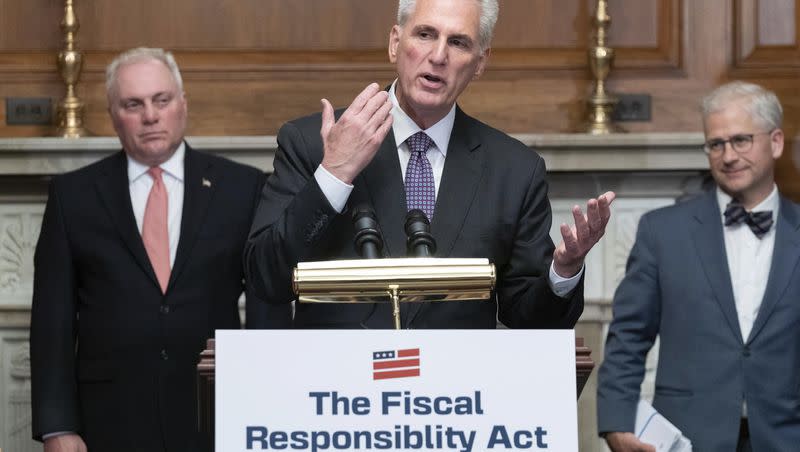House Freedom Caucus, other Republicans press McCarthy to cut spending for 2024 to 2022 levels

- Oops!Something went wrong.Please try again later.
It’s budget season, the time of year when federal lawmakers must pass spending bills to keep the government up and running. But in a divided Congress, successfully shepherding 12 appropriations bills through before a fast-approaching deadline of Sept. 30 poses a challenge for leadership.
The Fiscal Responsibility Act, negotiated by President Joe Biden and House Speaker Kevin McCarthy earlier this year, suspended the debt ceiling until 2025 in exchange for limiting federal spending to fiscal year 2023 levels in 2024, while allowing a 1% increase in spending in 2025.
But hardline members of the Republican conference want even lower caps on spending — which is why 21 members of Congress sent a letter Monday to McCarthy.
“Americans expect House Republicans to lead in divided government to achieve tangible results,” the letter, obtained by Deseret News, starts out.
“We therefore write to inform you that we cannot support appropriations bills that will produce a top-line discretionary spending level barely below the bloated FY 2023 level (already grossly increased by the lame-duck omnibus spending bill we all vehemently opposed a mere six months ago) and effectively in line with the cap set by the debt ceiling deal that we opposed and was supported by more Democrats than Republicans.”
It was signed by Rep. Scott Perry of Pennsylvania, Rep. Bob Good of Virginia, Rep. Lauren Boebert of Colorado and Rep. Eli Crane of Arizona, among others who requested that total spending shouldn’t exceed the 2022 level of $1.471 trillion.
The letter said that the signatories, many belonging to the House Freedom Caucus, including the caucus’ chairman, Perry, plan to vote against spending levels of $1.586 trillion, which was the total in 2023.
During his run for the speakership earlier this year, McCarthy had to work to win over the 20 members of the Republican conference who didn’t support him. To win their loyalty, McCarthy agreed to limit spending for 2024 at 2022 levels, and to push for spending cuts during the debt ceiling negotiations, as Roll Call reported at the time.
The speaker’s promise didn’t pan out as those members hoped.
Rep. Chip Roy of Texas, who helped spearhead the letter sent to McCarthy this week, told NBC News that conservatives are trying to right the wrongs in the debt ceiling deal.
“We have major disagreements with both how, and what, occurred with respect to the debt ceiling increase. So now we’re trying to put the band back together again,” said Roy.
Last month, House Appropriations Chairwoman Kay Granger reaffirmed the Republican position, stating in a recent press release that Republicans would cut $115 billion in “unnecessary partisan programs.”
“Because of years of out-of-control spending, it has been and will continue to be my priority to pass conservative bills that focus our limited resources on the core responsibilities of the federal government, including national defense, our veterans, and our border,” she said.
The debt ceiling bill created new provisions that would allow for automatic 1% cuts on spending bills if the appropriations bills aren’t passed by the end of the year. According to Politico, Democratic lawmakers, like Rep. Marcy Kaptur of Ohio, a House Appropriations Committee member, said that this might motivate Republicans to pass a continuing resolution instead.
That would allow federal government operations to carry on through this year without the passage of appropriations bills, but also opens up the possibility of a government shutdown if funding runs out, per the Government Accountability Office.
“We’re supposed to make our committees work. And when you have a (continuing resolution), you just continue from last year. So it’s like you’re backpedaling. You’re not going forward,” Kaptur said.
A Punchbowl News poll found that roughly 79% of Capitol Hill staffers say it’s more likely that Congress will not pass all 12 appropriations bills before the end of the fiscal year, triggering the need for continuing resolutions.
79% of Capitol Hill staffers believe that Congress will NOT pass all 12 appropriations bills before the end of the fiscal year pic.twitter.com/VhB3T8LTSr
— TheLobbyistGuy (@TheLobbyistGuy) July 5, 2023
Still, Rep. Garret Graves, R-La., said that McCarthy doesn’t want to spend money through continuing resolutions: “And it’s why we’ve tried to move these appropriations bills through the process,” Graves said.
McCarthy also said he prefers to pass the 12 appropriations bills separately instead of in one omnibus package. This typically happens when Congress can’t meet the deadline for passing the individual spending bills.
“I’m never putting an omni on the floor,” McCarthy told reporters. “That doesn’t mean that we might do a couple together if need be, but our intention is trying to do them individually.”
.@SpeakerMcCarthy said he is focused on getting all 12 appropriations bills done.
"I'm never putting an omni on the floor," he said. "That doesn't mean that we might do a couple together if need be, but our intention is trying to do them individually."— Kyle Stewart (@KyleAlexStewart) July 11, 2023
But it appears the two chambers of Congress are in opposition.
While the Republican-controlled House hopes to use the budget bills to cut spending below the terms in the debt ceiling bill, while also potentially attaching a string of conservative policies, like limiting FBI funding, protecting whistleblowers and extending pro-gun measures, as House Judiciary Chair Jim Jordan of Ohio asked Appropriations Chair Granger to do in a letter Tuesday.
But the Democrat-controlled Senate wants to keep spending in line with the debt ceiling deal, and may strip out the additional measures.
“Clearly, it’s a violation of the agreement that Speaker McCarthy struck with the president,” Sen. Chris Van Hollen, D-Md., told NBC News, saying that the speaker is appealing to the “very far right” members of Congress.
“It’s clearly going to make for some rocky moments.”

